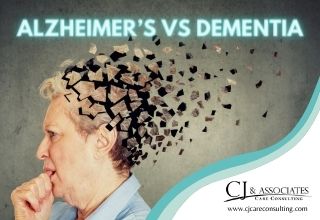As we age, one of the biggest fears that can arise is that of memory loss. The thought of not being able to hold on to precious memories and even being unable to recognize loved ones is a terrifying prospect that happens all too often to the elderly. Around the world, there are about 50 million people with dementia, with 10 million new cases occurring each year. While you might not be able to prevent it or dementia once it’s begun, it’s good to be informed so you know what to expect when it comes to yourself or a loved one.
Alzheimer’s disease is often a term used interchangeably with dementia, but they’re not quite the same. Rather, Alzheimer’s is a type of dementia, but not all dementia is Alzheimer’s disease. In today’s blog, we’ll discuss the differences between the two so you can know what to expect from either diagnosis.
What Is Dementia?
According to the World Health Organization (WHO), dementia is a chronic, progressive syndrome “in which there is deterioration in cognitive function (i.e. the ability to process thought) beyond what might be expected from normal ageing.” Though memory loss is the most common symptom of dementia, it can also affect comprehension, learning capacity, language, judgment, orientation, and more.
The early symptoms of dementia are easy to overlook, as they tend to present as minor forgetfulness or losing track of time and place. As time goes on, seniors with dementia may become lost in their own home, may forget the names of loved ones, or struggle with communication. Forgetting loved ones as well as difficulty walking and caring for themselves are late stage developments in dementia.
What Is Alzheimer’s Disease?
Dementia can come in many forms, including vascular dementia, Lewy body dementia, Huntington’s disease, frontotemporal dementia, Parkinson’s disease, and mixed dementia. The most common form, however, is Alzheimer’s disease, accounting for roughly 60-70% of cases. The main difference is that Alzheimer’s is a disease, whereas dementia is a description of a group of symptoms that relate to the deterioration of cognitive function. Alzheimer’s disease will always include dementia, but not all forms of dementia are Alzheimer’s disease.
Treating Alzheimer’s Disease & Dementia
Although scientists are always searching, there is no cure at the present for Alzheimer’s disease or any way to slow the progression of dementia. However, there may be associated illnesses that can be treated to ease the burden of dementia. The main goal when it comes to treatment of these conditions is preserving and improving quality of life. This includes:
- Early diagnosis
- Working to sharpen physical and cognitive health
- Challenging behavioral and psychological symptoms such as the increased aggression that can come with dementia
- Offering information and support long-term to caregivers of loved ones with dementia
Both dementia and Alzheimer’s disease can be devastating diagnoses for seniors, and much of the quality of life from that point on depends on having the right support. At CJ & Associates Care Consulting, we offer physical, mental, cognitive, and psychological evaluations to start as well as help developing a plan of care. We can help you with setting up caregivers and home health services, as well. Contact us today to learn more about what we can do in your case.






